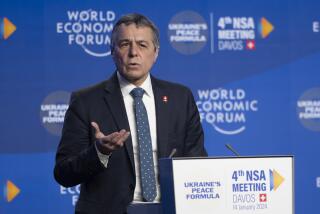Arabs, Israel Call Talks Productive
- Share via
MOSCOW — For the first time in decades of hostility, Israel and 11 Arab states turned Wednesday from political rhetoric to discussions about issues as prosaic as water resources and phone lines.
Although Syria, Lebanon and the Palestinian delegation boycotted the two-day, multilateral Middle East peace talks, participants said at the close of the conference that it had been more productive than expected.
“If you want to argue that in two or three days we’ve solved all our problems, you’re wrong,” Israeli Foreign Minister David Levy said. But “Are we satisfied? Yes!”
Participants agreed to hold a series of meetings around the world this spring to build on the foundation laid Wednesday in five key areas: refugees, economic cooperation, arms control, environment and water.
In the most critical of the day’s working group meetings, the committee on regional security decided to hold a series of arms control seminars led by Russian, European and American officials to teach their Mideast counterparts how it is done.
Participants said the group will first work solely on education about arms control, then begin to develop confidence-building measures that could eventually include Middle East hot-lines, joint patrols and inspections.
They acknowledged that actual cuts in the region’s enormous stockpiles of arms were a long way off, but said that the meeting’s businesslike atmosphere and lack of the usual speechifying offered at least some hope for progress.
Officials who attended other working groups also reported no-nonsense atmospheres and consensus decisions.
However, the absence of the Syrians and Lebanese cast doubt on how great an impact the peace process could have. And the dispute over the Palestinian delegation cast a pall that began Tuesday, when the conference opened without them, and continued into the second day despite initial hope of a compromise.
Palestinian leaders met with Secretary of State James A. Baker III for more than an hour on Wednesday, but no resolution was reported.
The Palestinians, who had arrived in Moscow late Monday night, failed to gain permission from the conference’s co-sponsors, the United States and Russia, to change the composition of their delegation. They insisted on adding Palestinians from Jerusalem and from the exiled communities to those from the West Bank and Gaza Strip, who attended the opening peace conference in Madrid last October.
Israel had refused to deal with any Palestinians except those from the occupied territories. The Palestinians accepted those limitations before going to Madrid. As organizers of the talks, Russia and the United States maintained that they had to stick to the original formula, maintaining that changing the rules would crimp the peace process.
Palestinian spokeswoman Hanan Ashrawi argued that the conference made little sense without her delegation, “since the Palestinians, in a sense, have the key to the stability in the region.”
She objected vehemently to the arguments against allowing the new delegation members to take part.
“I will say this very clearly: We, as Palestinians, determine who is a Palestinian,” she said. “We have no problem on deciding who is a Palestinian, and Israel cannot decide for us who is a Palestinian.”
Baker proposed a compromise under which Palestinian exiles could later join the working groups that concern them most, those on refugees and economic cooperation.
But Ashrawi said the Palestinian delegation wanted to participate in all working groups and is proposing two new ones: on the status of Jerusalem and on human rights in the Middle East.
“We want to be inside,” she said. “We certainly want to be accepted as an equal member in this community of nations. We do not want to be treated like an orphan or like a subhuman species or like people who do not have rights.”
Levy indicated Wednesday that Israel is not prepared to accept any changes at all in the Madrid formula. When it has been so hard to reach agreement, he said, “Israel jealously guards every comma.”
It was not clear how the conference participants would resolve the dispute--or, for that matter, other disputes that will arise.
An American official said decisions would be taken by consensus. But “it’s not construed as something where anyone has a unilateral veto,” he added, implying that Israel may not be able to stand alone, or with only American support, against Arab decisions.
Despite the Palestinian dispute, some officials said they had made more progress than anticipated. Wednesday’s talks, which had been expected to discuss only procedure and no issues of substance, actually initiated the long, slow process of breaking down barriers.
More to Read
Sign up for Essential California
The most important California stories and recommendations in your inbox every morning.
You may occasionally receive promotional content from the Los Angeles Times.













